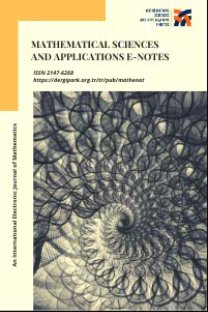On the Analysis of Unreliable Markovian Multiserver Queue with Retrials and Impatience
On the Analysis of Unreliable Markovian Multiserver Queue with Retrials and Impatience
___
- [1] Aguir, S., Karaesmen, F., Aksin, O.Z., Chauvet,F., The impact of retrials on call center performance, OR Spectr. 26 (2004) 353-376.
- [2] Artalejo, J.R., A classified bibliography of research on retrial queues: Progress in 1990-1999.,Busin. Econ.,7 (1999), 187-211.
- [3] Artalejo, J.R., Accessible bibliography on retrial queues, Math. Comp. Mod., 30 (1999), 1-6.
- [4] Artalejo, J.R. and Gomez-Corral, A., Retrial Queueing Systems: A Computational Approach, Springer, Spain, pp: 318. (2008)
- [5] Artalejo, J.R., Accessible bibliography on retrial queues: Progress in 2000-2009., Math. Comp. Mod., 51 (2010), 1071-1081.
- [6] Brian, Crawford, P., Approximate analysis of an unreliable M/M/2 retrial queue, thesis, (2007)
- [7] Cohen, J. W., Basic problems of telephone traffic theory and the influence of repeated calls, Philips Telecommunication Review, 18, No. 2, 1957.
- [8] Courtois, P.J., Decomposability, instabilities, and saturation in multiprogramming systems, Communications of the ACM, 18 (7) (1975), 371-377.
- [9] Elhaddad, M., Belarbi, F., Approximate analysis of an unreliable M/M/c retrial queue with phase merging algorithm, New Trends in Mathematical Sciences, 4, (2016), 9-21.
- [10] Falin, G., A survey of retrial queues, Queueing Sys., 7, (1990), 127-167.
- [11] Falin, G., Artalejo, J.R., Approximations for multiserver queues with balking/retrial discipline, Or Spektrum, 17, (1995), 239-244.
- [12] Falin, G.I. and Templeton, J.G.C., Retrial queues, Champman and Hall, London, pp: 328. (1997)
- [13] Korolyuk, V.S. and Korolyuk, V.V., Stochastic models of systems. Kluwer Academic Publishers, Boston (1999).
- [14] Korolyuk, V. S., Melikov, A. Z., Ponomarenko, L. A., Rustamov, A. M., Methods for analysis of multi-channel queueing system with instantaneous and delayed feedbacks,Cybernetics and Systems Analysis, Vol. 52, No. 1 (2016), 58-70.
- [15] Kulkarni, V.G. and Choi, B.D., Retrial queues with server subject to breakdown and repairs, Queueing Sys., 7 (1990), 191-208.
- [16] Kosten, L., On the influence of repeated calls in the theory of probabilities of blocking,De Ingenieur, 59,(1947)
- [17] Shin, Y.W., Choo, T.S., M/M/s queue with impatient customers and retrials, Applied Mathematical Modelling, 33 (2009), 2596-2606.
- [18] Subramanian, M.G., Ayyappan, G. and Sekar, G., M/M/c Retrial queueing system with breakdown and repair of services, Asian Journal of Mthematics and Statistics 4 (4) (2011), 214-223.
- ISSN: 2147-6268
- Yayın Aralığı: 4
- Başlangıç: 2013
- Yayıncı: -
On the Analysis of Unreliable Markovian Multiserver Queue with Retrials and Impatience
Meriem ELHADDAD, Faiza LIMAM BELARBI
Fractional Hermite-Hadamard Type Inequalities for Functions Whose Derivatives are s-Preinvex
Badreddine MEFTAH, Abdourazek SOUAHI
Fuzzy Fibonacci and Fuzzy Lucas Numbers with their Properties
Nurettin IRMAK, Naime DEMİRTAŞ
Operator $(\alpha,m)$-convex functions and applications for synchronous and asynchronous functions
Erdal ÜNLÜYOL, Yeter ERDAŞ, Seren SALAŞ
On the Quadra Fibona-Pell and Hexa Fibona-Pell-Jacobsthal Sequences
Relations Among Bell Polynomials, Central Factorial Numbers, and Central Bell Polynomials
On The Difference Sequence Space $l_p(\hat{T}^q)$
